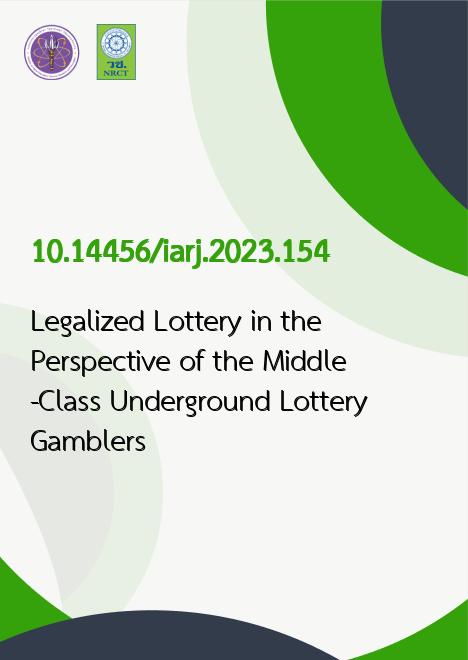
|
Legalized Lottery in the Perspective of the Middle-Class Underground Lottery Gamblers |
|---|---|
| รหัสดีโอไอ | |
| Creator | Wachirarat Nirantechaphat |
| Title | Legalized Lottery in the Perspective of the Middle-Class Underground Lottery Gamblers |
| Contributor | Wachirarat Nirantechaphat |
| Publisher | DR.KEN Institute of Academic Development and Promotion. |
| Publication Year | 2566 |
| Journal Title | Interdisciplinary Academic and Research Journal |
| Journal Vol. | 3 |
| Journal No. | 3 |
| Page no. | 657-670 |
| Keyword | Lottery, Gamblers, Middle-Class |
| URL Website | https://so03.tci-thaijo.org/index.php/IARJ/about |
| Website title | https://so03.tci-thaijo.org/index.php/IARJ/article/view/267765 |
| ISSN | 2774-0374 |
| Abstract | The government lottery and the underground lottery have been associated with Thai society for a long time. The first underground lottery occurred around the year 1817. In 2001, a survey by the Government Lottery Office found that half of the country's people played the lottery, so the Thaksin Shinawatra government initiated a land-based lottery policy to break the dark money cycle to bring illegal money from the underground lottery to land. The Thai society's underground lottery communication network consists of dealers, dealers, and some gamblers who are both sellers and gamblers. However, a study of the government lottery that reproduces the wealth discourse in society demonstrates the generation and reproduction of the wealth discourse associated with the government lottery. And giving meaning to housewives' actions regarding the government lottery, found that wealth makes it a reality in society. This article is part of the research titled "Identities and Communication Network of the Middle-Class Underground Lotto Gamblers," this article presents a qualitative study that aims to examine the perspectives of middle-class underground lottery gamblers toward the legalized lottery. The research employed in-depth interviews as the primary data collection method, conducted with 15 respondents from Nakhon Ratchasima Province, who had more than 5 years of experience in the underground lottery and a monthly income of at least 18,000 baht. The respondents were selected based on their occupation, family reputation, and lifestyle using the snowball sampling technique. The study was conducted over 10 months, from August 1, 2019, to May 2, 2020. To gain an insider view, the researcher also conducted supplementary field observations as a gambler. Findings suggest middle-class underground lottery gamblers encourage the implementation of land-based lotteries as it helps to reduce sales problems. Additionally, overpriced lottery and equality in the buying-selling system can reduce the problem of unlimited numbers in the underground lottery system. However, this policy alone cannot eliminate the underground lottery from Thai society. This research offers insights that can be used as a guideline for formulating lottery policies and solutions to solving underground lottery problems. |